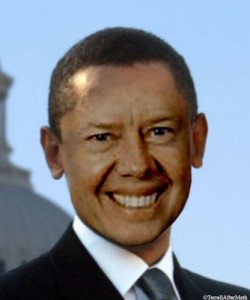Until last week, some had hoped that, having failed to develop a credible foreign policy, President Obama may at least be capable of engaging in serious debate with his critics.
Obama’s West Point address dashed that hope.
In it, he showed that he has become prisoner of a narrative in which his critics are cast as warmongers who need to be restrained by level-headed statesmen like him. In other words: he just doesn’t get it.
What is at issue now is limiting the damage that Obama has already done to US foreign policy across the board.
Obama accuses his critics of urging the use military force in every instance. The opposite is true. No one has called for invading “every country that harbors terrorists.” No one invited Obama to invade Iran to stop its nuclear program, nor has anyone demanded that American troops be parachuted into Syria in the midst of a sectarian war. Needless to say, no one has demanded that Russia be bombed either.
In all those cases, and many others, the problem is not Obama’s isolationism but his oscillation.
It was Obama who, through his AfPak adviser Richard Holbrooke, threatened to “chase terrorists” from Afghanistan into Pakistan but then settled for drone attacks from a distance, killing thousands of civilians.
As for Iran, it is Obama who keeps repeating the childish mantra of “all options are on the table” while acting as lobbyist against sanctions to curtail the mullahs’ nuclear ambitions.
On Syria, it was Obama who opened the game by publicly stating that “President Assad must go” and later drawing red lines against the use of chemical weapons by the Assad regime. Again, it was Obama who claimed he would not allow Russia to annex Crimea and threaten Ukraine by threatening “consequences.”
The problem with Obama’s foreign policy is not inaction either. In fact, this administration, especially since John Kerry became secretary of state, has been hyperactive — but only in words. Together, the tandem has made countless speeches and trips. Kerry has visited the Middle East a dozen times after Obama all but promised that he would put a Palestinian state on the map within a year.
In the style of a butterfly, this administration focuses on one issue for a short while, then flies to another. The Israel-Palestine issue, Iran, Syria and Ukraine are not the only examples. Other examples include the fiasco of the global-warming summit that Obama attended in Copenhagen, the all-but-stalled trade negotiations with the European Union, the meaningless handshakes with Hugo Chavez and Raoul Castro, and apologizing tours to various Muslim countries.
In the Egyptian crisis, he first backed Hosni Mubarak, then dropped him and made a deal with the Muslim Brotherhood until its regime was kicked out in a coup. No one asked him to get involved.
The criticism is not that Obama has been lethargic. It is that he has been too active for the wrong reasons. He diminished the stature of the American presidency by making a number of humiliating trips in search of photo opportunities.
He flew to Saudi Arabia where he was not even welcomed at the airport by the mayor of Riyadh and denied a state banquet, a classical diplomatic cliché.
He chased another photo opportunity in Afghanistan only to see his demand for a meeting with President Hamid Karzai summarily rejected.
The Obama-Kerry record is one of setting high goals and consistently failing to attain them.
John F. Kennedy had advised leaders who win office to keep their ideals but lose their illusions. Obama and Kerry have done the opposite, becoming prisoners of their rhetoric.
Obama often boasts of his achievements: ending the war in Afghanistan and crushing al Qaeda. However, it is quite possible that, by fixing a date for US military withdrawal, he encouraged the Taliban and other terrorists to bide their time, thus prolonging the Afghan war into the unknown future.
As for al Qaeda, the group had been smashed as an organization as early as 2002. However, under Obama’s watch, more than a dozen new al Qaeda franchises have appeared in Asia and Africa with recruiting branches in at least eight European Union countries.
Obama also boasts of the “multilateral” scheme to deal with Iran and Syria. In both cases, however, he has tied his own administration’s hands and given Russia the final say. Iran has speeded up its nuclear program while Russia has massively increased arms supplies to Assad in Syria. To please Russia, he took part in the Geneva I and II comedies on Syria and until last month refused to recognize the Syrian opposition. He also threatened to veto any new sanctions against Iran, even with reference to US hostages still held by the mullahs.
Building a foreign policy based on braggadocio is dangerous, especially for a “superpower.” This is why the first damage-limitation move should be a reduction in the rhythm and tempo of Obama’s finger-waving “don’t make a mistake” threatening rhetoric.
For example, on a recent trip to Tokyo, he didn’t have to tell the Japanese that the US-Japan military accords covered any Chinese threats to Japanese territorial waters and islands in the East China Sea. All US presidents Harry S. Truman had refused to make such a statement.
As a result, just this past week, the Chinese sent a flotilla through Japanese waters to show the flag. What is Obama going to do?
Here is a piece of advice for Obama: if you don’t wish to do anything, then do nothing. And that includes not talking too much.
. . . . . . . . . . . . . . . . . . . .
Amir Taheri writes for The New York Post.
